人教版英语七年级下册Unit 12 What did you do last weekend?复习课件(共61张PPT)
文档属性
| 名称 | 人教版英语七年级下册Unit 12 What did you do last weekend?复习课件(共61张PPT) | 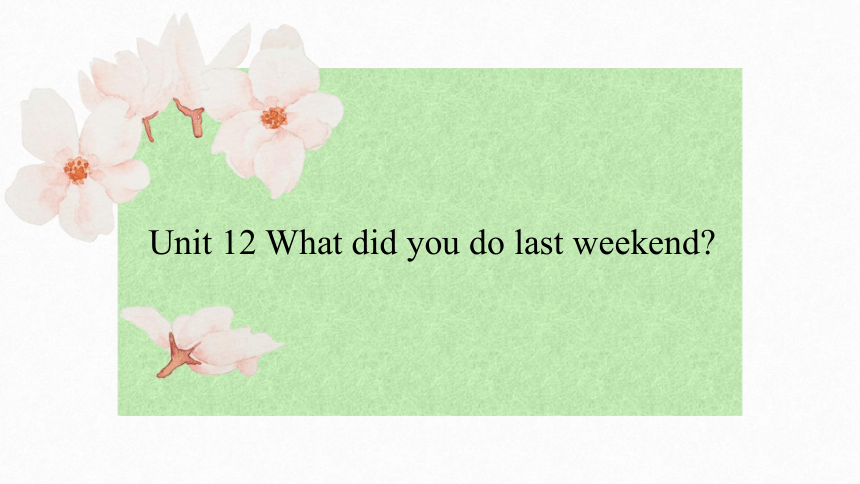 | |
| 格式 | zip | ||
| 文件大小 | 4.6MB | ||
| 资源类型 | 教案 | ||
| 版本资源 | 人教新目标(Go for it)版 | ||
| 科目 | 英语 | ||
| 更新时间 | 2021-12-26 17:03:51 | ||
图片预览

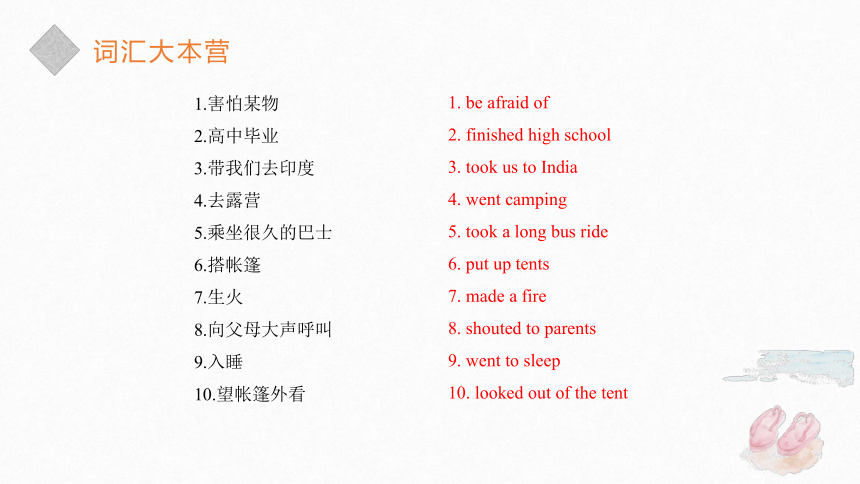
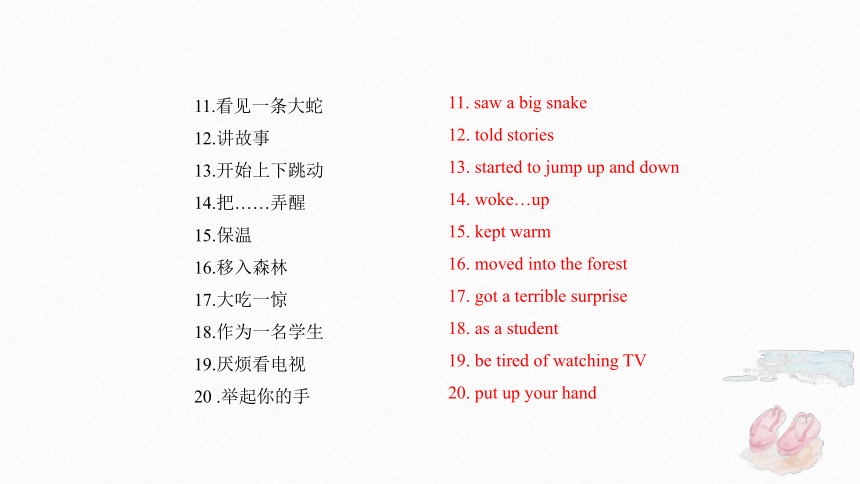
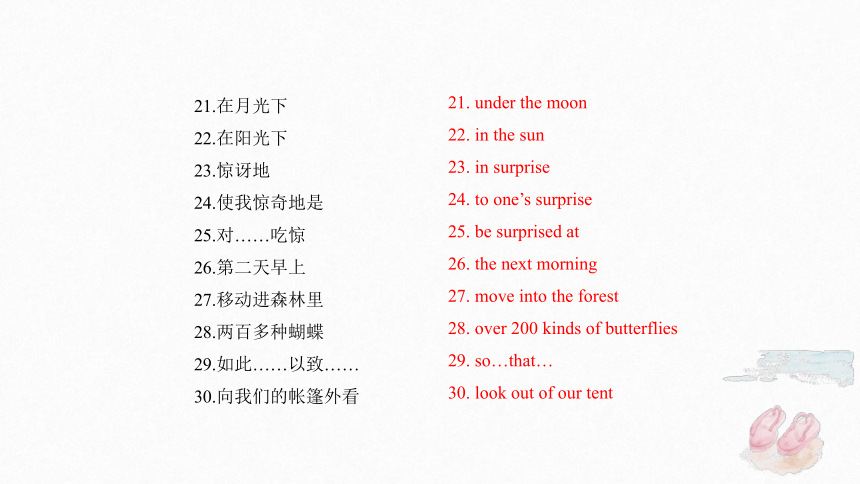

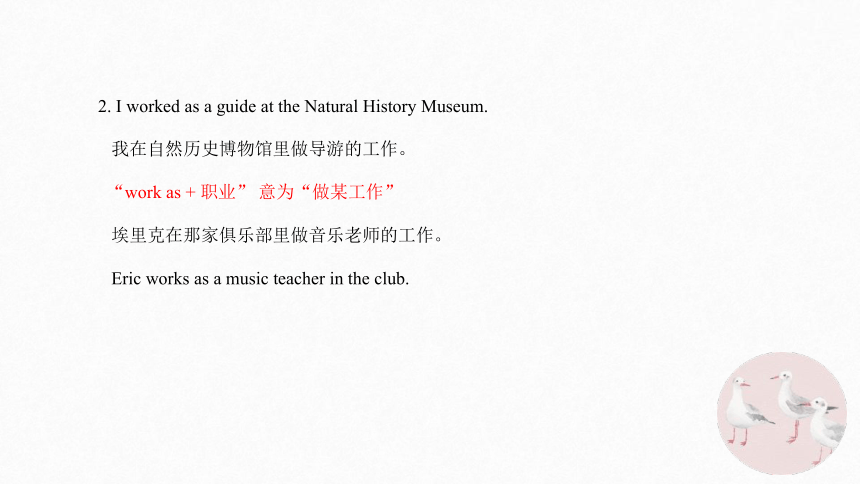
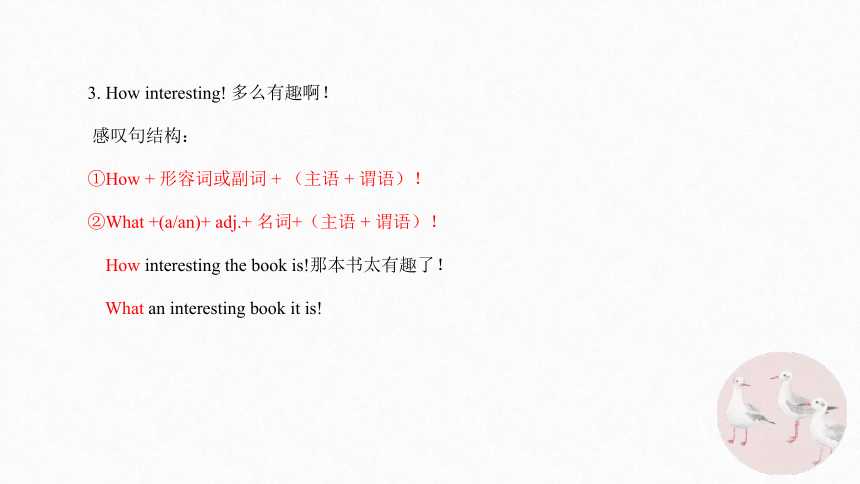
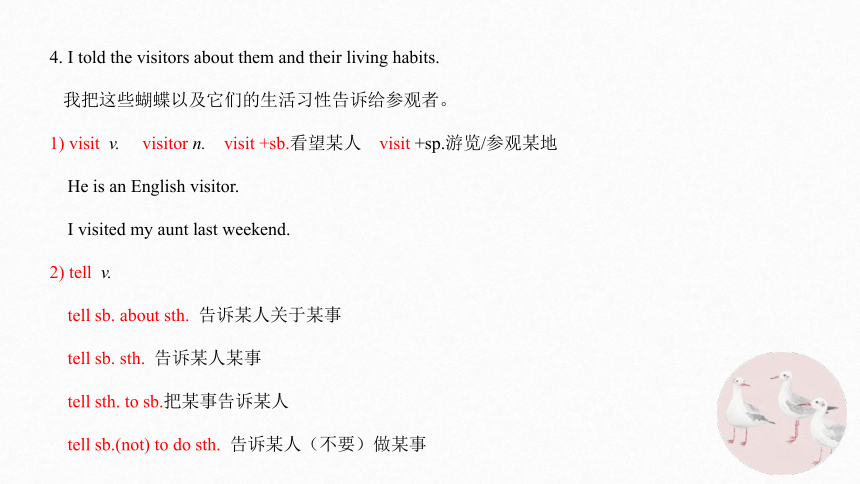
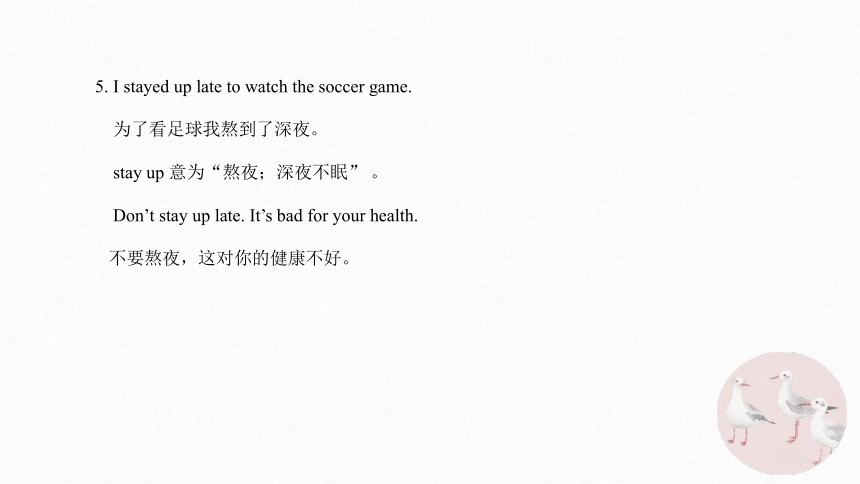
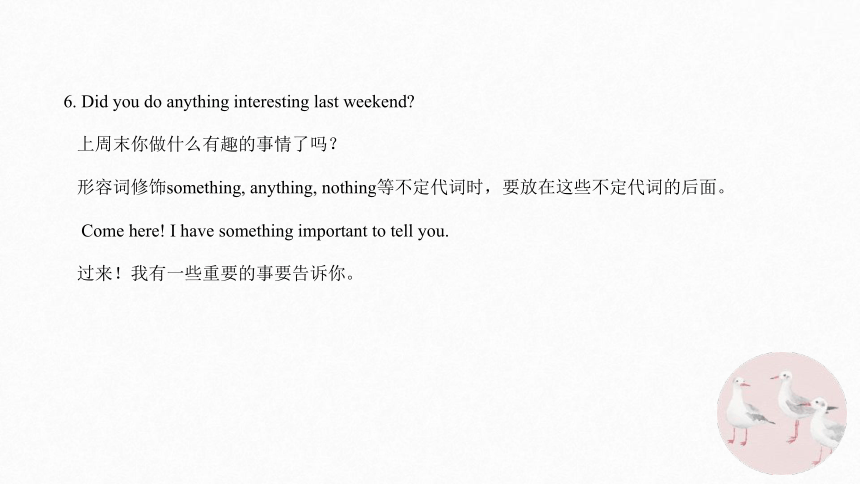
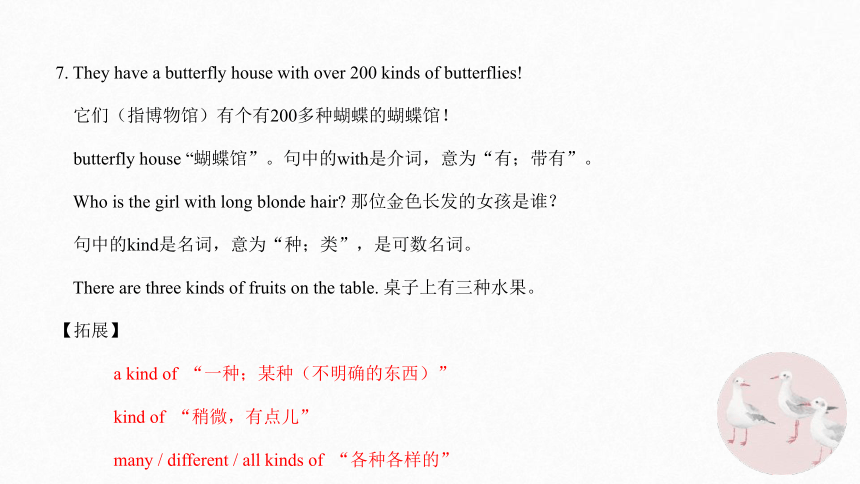
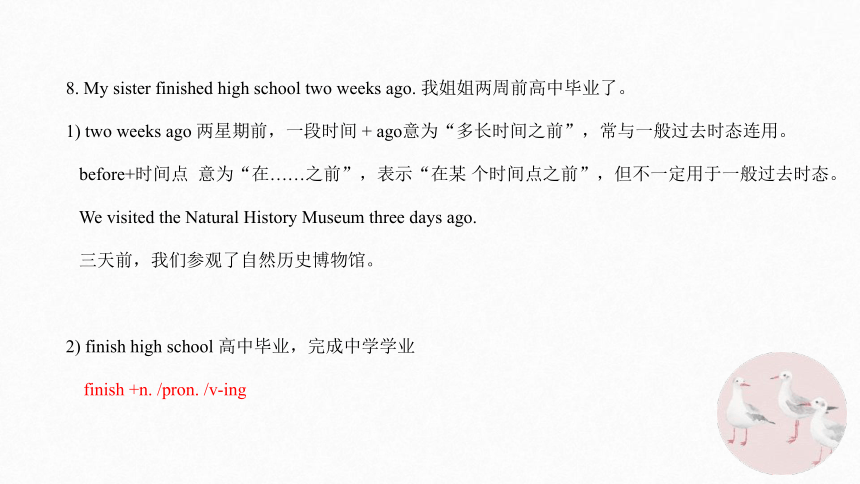
文档简介
(共61张PPT)
Unit 12 What did you do last weekend
1.害怕某物
2.高中毕业
3.带我们去印度
4.去露营
5.乘坐很久的巴士
6.搭帐篷
7.生火
8.向父母大声呼叫
9.入睡
10.望帐篷外看
1. be afraid of
2. finished high school
3. took us to India
4. went camping
5. took a long bus ride
6. put up tents
7. made a fire
8. shouted to parents
9. went to sleep
10. looked out of the tent
词汇大本营
11.看见一条大蛇
12.讲故事
13.开始上下跳动
14.把……弄醒
15.保温
16.移入森林
17.大吃一惊
18.作为一名学生
19.厌烦看电视
20 .举起你的手
11. saw a big snake
12. told stories
13. started to jump up and down
14. woke…up
15. kept warm
16. moved into the forest
17. got a terrible surprise
18. as a student
19. be tired of watching TV
20. put up your hand
21.在月光下
22.在阳光下
23.惊讶地
24.使我惊奇地是
25.对……吃惊
26.第二天早上
27.移动进森林里
28.两百多种蝴蝶
29.如此……以致……
30.向我们的帐篷外看
21. under the moon
22. in the sun
23. in surprise
24. to one’s surprise
25. be surprised at
26. the next morning
27. move into the forest
28. over 200 kinds of butterflies
29. so…that…
30. look out of our tent
1. sheep 名词“绵羊”。它是单复数同形,作主语时谓语动词的单复数形式要根据它在句中的意思来确定。类似的单词还有deer (鹿), Chinese (中国人)等。
Look, there are three sheep eating grass under the tree.
看! 树下有三只羊在吃草
Language points
2. I worked as a guide at the Natural History Museum.
我在自然历史博物馆里做导游的工作。
“work as + 职业” 意为“做某工作”
埃里克在那家俱乐部里做音乐老师的工作。
Eric works as a music teacher in the club.
3. How interesting! 多么有趣啊!
感叹句结构:
①How + 形容词或副词 + (主语 + 谓语)!
②What +(a/an)+ adj.+ 名词+(主语 + 谓语)!
How interesting the book is!那本书太有趣了!
What an interesting book it is!
4. I told the visitors about them and their living habits.
我把这些蝴蝶以及它们的生活习性告诉给参观者。
1) visit v. visitor n. visit +sb.看望某人 visit +sp.游览/参观某地
He is an English visitor.
I visited my aunt last weekend.
2) tell v.
tell sb. about sth. 告诉某人关于某事
tell sb. sth. 告诉某人某事
tell sth. to sb.把某事告诉某人
tell sb.(not) to do sth. 告诉某人(不要)做某事
5. I stayed up late to watch the soccer game.
为了看足球我熬到了深夜。
stay up 意为“熬夜;深夜不眠” 。
Don’t stay up late. It’s bad for your health.
不要熬夜,这对你的健康不好。
6. Did you do anything interesting last weekend
上周末你做什么有趣的事情了吗?
形容词修饰something, anything, nothing等不定代词时,要放在这些不定代词的后面。
Come here! I have something important to tell you.
过来!我有一些重要的事要告诉你。
7. They have a butterfly house with over 200 kinds of butterflies!
它们(指博物馆)有个有200多种蝴蝶的蝴蝶馆!
butterfly house “蝴蝶馆”。句中的with是介词,意为“有;带有”。
Who is the girl with long blonde hair 那位金色长发的女孩是谁?
句中的kind是名词,意为“种;类”,是可数名词。
There are three kinds of fruits on the table. 桌子上有三种水果。
【拓展】
a kind of “一种;某种(不明确的东西)”
kind of “稍微,有点儿”
many / different / all kinds of “各种各样的”
8. My sister finished high school two weeks ago. 我姐姐两周前高中毕业了。
1) two weeks ago 两星期前,一段时间 + ago意为“多长时间之前”,常与一般过去时态连用。
before+时间点 意为“在……之前”,表示“在某 个时间点之前”,但不一定用于一般过去时态。
We visited the Natural History Museum three days ago.
三天前,我们参观了自然历史博物馆。
2) finish high school 高中毕业,完成中学学业
finish +n. /pron. /v-ing
9. As a special gift, our parents took us to India.
作为一份特殊的礼物, 我爸妈带着我们去了印度。
1) as 表示“作为……; 当作……”,其后可以接职业,用途,特点等。用在句首时,这种短语的后面往往有逗号与语句的主体隔开。
As a student, I must work hard. 作为一名学生,我必须努力学习。
2) take 带领 take sb. to +地点则表示“带领某人去某处”
On Sundays, the father would take his son to the park.
一到星期天,爸爸便会带他的儿子去公园。
bring 意为“拿来,带来”,表示“拿到靠说话人近的地方”。
take 意为“拿走,带走”,表示“拿到远离说话人远的地方”。
carry 意为“扛,搬”,用力移动,没有方向性。
fetch 意为“去取,去拿”表示往返拿物。
The Young Pioneer ______ water for the old man every day.
A. fetches B. brings C. takes D. carries
【解析】
bring从远处把某物拿到跟前;take…(with)随身带上某物,即物就在旁边;通过用力搬运、扛、抬等,那是carry的能力范围;fetch去把某物拿来,强调的是“去、回”双线行为,故选D。
10. There we put up our tents and made a fire to keep us warm and cook food on.
那里我们搭起帐篷,生火取暖并在上面煮食物。
1) Let’s put up the tent.让我们将帐篷搭起来吧。
2) If you have any questions, please put up your hands. 如果你有什么问题,请举起手来。
3) keep us warm 使得我们暖和; make a fire 生火
本句的主体部分是we put up tents and made a fire, 后续的 to keep us warm and cook food on (it) 表达的是made a fire 的目的。句尾介词“on” 后有所省略,以避免重复。
11. On the first night, we just sat under the moon and told each other stories.
在第一个晚上,我们就坐在月亮下,并互相讲故事。
1) each other 互相,彼此
2) at night (在夜里), in the morning (在上午), in the evening (在下午)等,但表示“在某一天上午、下午或晚上等”的特定时间,往往使用介词on。
On the early morning of November 20th, we got a special postcard.
在11月20号一大清早,我们收到了一张特殊的明信片。
12. I was so tired that I went to sleep early.
我太疲劳了,以至于早早就睡觉了。
“so + 形容词 + that句子 ”,意为 “如此……以至于”
I was so scared that I couldn’t move. 我是那么害怕,一动都不敢动。
“so…that”可以和“too…to…”句式结构互换同义句。
too + adj. + to+ v.
Paul is so lazy that he doesn’t go to work.
Paul is to lazy to go to work.
【辨析】 so that / so… that
so that引导目的状语从句时,表示“以便;为了”。
I got up early so that I could catch the early bus. 我早起是为了搭乘早班车。
so +形容词或副词+ that引导结果状语从句,意为“如此……以致于……”。
He runs so fast that nobody can catch up with him.
他跑得非常快,没人能追上他。
13.The next morning ,my sister and I got a terrible surprise.
surprise n. 惊奇,吃惊 v. 使…吃惊
surprised adj. 感到吃惊(主语人 ) surprising令人吃惊的(主语物)
【拓展】
get a (terrible) surprise(大)吃(一)惊 in surprise惊奇地
give a surprise to sb. 给某人惊喜 = give sb. a surprise
surprise +sb.使某人吃惊 be surprised at对…感到吃惊
Bill looked at him in surprise.
The news surprised us.
We are surprised at the surprising news.
14. When we looked out of our tent, we saw a big snake sleeping near the fire.
1) look out of 向……外看 Please don’t look out of the window in class.
look out 当心 Look out! Here comes the cars.
2) see sb. doing sth.看见某人正在做某事(动作正在发生)
see sb. do sth.看见某人做某事(动作的全过程)
I saw him playing soccer on the playground just now.
I saw him go into the shop.
15. We shouted to our parents to let them know about the danger.
1) shout to sb. (无恶意) shout at sb. (生气) 向…喊
We shouted to the driver, but he didn’t hear us.
Father shouted at the girl, and the girl cried.
2) let sb. (not) do sth. 让某人(不要)做某事
16. My dad started to jump up and down in their tent.
我的爸爸开始在帐篷里上下跳跃。
1) start +to v. / v-ing开始做某事 = begin to v. / v-ing
The child stared to cry.
2) jump up and down 上下跳跃
17. This woke the snake up and it moved into the forest near the lake.
wake up 把…弄醒
跟名词时可以放在wake up的后面或中间;但是如果是跟代词的话应放于 wake up 的中间。
Please wake Lucy up at six o’clock. 请在6点叫醒Lucy。
Lily is sleeping . Don’t wake her up. Lily 在睡觉,别吵醒她。
18. My dad told me later that snakes don’t have ears but he can feel things moving.
see/watch/feel/hear sb. doing sth. 看到/观察到/觉得/听到某人在做某事
We can hear water running from the mountain.
我们能听到水从山上流下来的声音。
【牛刀小试】
1. ―_____ fine day it is today!
―Yes, the sunshine is _____ beautiful that I’d like to go swimming in the sea.
A. How, such B. What a, very C. How, so D. What a, so
【解析】
感叹句中what修饰名词,how修饰形容词和副词,第一空后接的是名词,用what;第二空后面有that,so…that…表示“如此……以致……”,用so,所以选D。
2. She bought a digital camera online _____ she would save a lot of time.
A. so that B. as soon as C. no matter D. such that
【解析】
考查so that的用法,她买数码相机的是为了可以节约一些时间,so that最符合句意,故选A。
3. When I passed the classroom, I heard a girl _____ in it.
A. sing B. losing C. sang D. singing
【解析】
考查hear的用法。“当我经过教室,我听到了一个女孩正在里面唱歌。”表示当时的动作,用现在进行时更符合,故选D。
① 表示过去某个时间发生的动作或存在的状态。
My father _______in Shanghai last year. 我爸爸去年在上海工作。
My father was at work yesterday afternoon
I got up at six thirty yesterday morning.
②表示过去的习惯性或经常发生的动作,常和often经常,always总是,once a week一周一次,等表示频度的时间状语连用。
I often _____________on foot.(过去)我经常步行去上学。
③与when等连词引导的 状语从句连用。
When she got home, she _____a short rest. 当她到家时,她稍微休息了一下。
worked
went to school
had
语法探究:一般过去时重难点
法宝之一:时间状语
一般过去时的判断标志词
yesterday(昨天) the day before yesterday(前天) the day before last(上前天) just now (刚刚) yesterday morning (afternoon, evening, night)(昨天早上、昨天下午、昨天晚上、昨夜)
last week (month, year ,winter …)(上星期、上个月、去年)
two days (an hour/ a week/ three years) ago 两天(一周、三年)前
in 1990 (在1990年) in 2008… (在2008年)
一般过去时的两大法宝
法宝之二:动词过去式
口诀:一加ed,二加d,三要双写,四注意,y变成ied,特殊形式特殊记。
规则动词的过去式变化如下:
1.一般情况下,动词词尾加 -ed ,如:look–looked play–played start–started
2.以不发音的 -e 结尾动词,动词词尾加 -d,如: use–used hope–hoped live–lived
3.以辅音字母 + y结尾的动词,把-y变为-i 再加-ed,如:study–studied cry–cried carry–carried
4.以一个辅音字母结尾的重读闭音节动词,双写词尾辅音字母,加-ed,
如: stop–stopped beg–begged plan–planned
不规则动词的过去式
am, is -- was
are -- were
do -- did
go -- went
have -- had
see -- saw
can -- could
may -- might
eat -- ate
find -- found
make -- made
hear -- heard
run -- ran
take -- took
hold -- held
speak -- spoke
leave -- left
keep -- kept
sleep -- slept
sweep -- swept
tell -- told
sell -- sold
begin -- began
sing -- sang
sit -- sat
swim -- swam
ring -- rang
give -- gave
buy -- bought
think -- thought
teach -- taught
catch -- caught
come -- came
become -- became
grow -- grew
know -- knew
throw -- threw
blow -- blew
write -- wrote
drive -- drove
ride – rode
get -- got
forget -- forgot
lend -- lent
send -- sent
spend -- spent
say -- said
pay -- paid
stand -- stood
understand-- understood
let -- let
put -- put
cut -- cut
read -- read
3.Last month, we (learn) Unit 8.
用所给动词的适当形式填空:
1.Be动词的句子:
主语+was/ were+…
2.含情态动词的句子:
主语+情态动词的过去式+动词原形+…
3.行为动词的句子:
主语+行为动词的过去式+…
1.一般过去时肯定句的结构:
1.He (be) at school yesterday(昨天).
was
2.They (be) in Beijing in 2004.
were
learned
4.I (study) at that school two years ago(两年前).
studied
5.She (can dance) when she was 10 years old.
could dance
过去的时间
过去的时间
过去的时间
过去的时间
过去的时间
1.Be动词的句子:
主语+ was/were + not +…were
2.含情态动词的句子:
主语+情态动词的过去式+not+动词原形+…
3.行为动词的句子:
主语+didn’t+动词原形+…
2.一般过去时否定句的结构:
用所给动词的适当形式填空:
1. I (be not) at home yesterday.
was not
过去的时间
2. They (be not) in the school play in 2008.
were not
过去的时间
3.Mary (do not) his homework last Sunday.
didn’t do
过去的时间
4. We (not see) Tony two hours ago.
didn’t see
过去的时间
2. Mary (clean) her room last Saturday
clean
4. Where you (go) last vacation
1. (be) the weather cloudy yesterday
3. What she (do) last weekend
1.Be动词的句子:
3.一般过去时一般疑问句的结构:
Was/ Were +主语+…
2.含情态动词的句子:
情态动词的过去式+主语+动词原形+…?
3.行为动词的句子:
4. 结构:
Did+主语+动词原形+…?
用所给动词的适当形式填空:
Was
过去的时间
did
Did
go
过去的时间
过去的时间
过去的时间
do
did
疑问词+ 一般疑问句的结构?
根据要求改写下列句子。
1. They had a meeting yesterday. (改为一般疑问句)
2. Mrs. Black does some cleaning every Sunday. (改为一般疑问句)
3. My brother went to Shanghai three days ago.(对划线部分提问)
4. There were no classes last Saturday afternoon. (改为反意疑问句)
5. It was November 10th the day before yesterday.(对划线部分提问)
【解析】
根据一般过去时的肯定句、否定句和一般疑问句的句式结构,得知:
1. Did they have a meeting yesterday
2. Does Mrs. Black do some cleaning every Sunday
3. When did your brother go to Shanghai
4. There were no classes last Saturday afternoon, were there
5. What was the date the day before yesterday
单项选择。
1.—Did you do ____ last Sunday —Yes, I did.
A. something interesting B. interesting something
C. anything interesting D. interesting anything
2. ____ a special gift, my parents took me to Hainan on vacation.
A. For B. As C. With D. On
课堂练习
3. At last they ____ their tents by the river.
A. put up B. put off C. put on D. put out
4. After that, they make a fire ____ us warm and cook food ____.
A. to keep; on B. keep; on C. to keep; with D. keep; with
5. Teresa is ____ nervous ____ she can't talk in front of the class.
A. such; that B. too; to C. so; that D. too; that
答案:1-5. CBACC
二. 句型转换。
1. Lucy did her homework at home. (改否定句)
Lucy _______ _______ her homework at home.
2. His father worked all day last Monday. (改一般疑问句)
_______ his father _______ all day last Monday
3. I went to the movie last night. (对划线部分提问)
_______ _______ _______ _______ _______ the movie
4. I was very busy last week. (改否定句和一般疑问句)
I _______ very busy last week.
_______ you very busy last week
5. There was some orange in the cup. (变一般疑问句)
_______ there _______ orange in the cup
答案:1. didn’t do 2. Did; work 3. When did you go to
4. wasn’t; Were 5. Was; any
三. 选词填空。
1. She went _______ the kitchen to cook some food.
2. The _______ circles (围绕) the earth every 28 days.
3. They came to visit China two days _______.
ago, tent, surprise, moon, scared, move, start, into
4. Do you know how to put up a _______
5. She got a great _______ when she got the Iphone5.
6. My grandparents _______ to the countryside last year. They lived with my uncle in a village.
7. She _______ to learn English when she was ten.
8. She was really _______ to cross the rope way.
答案:1. into 2. moon 3. ago 4. tent 5. surprise 6. moved 7. started 8. scared
四. 选择方框中适当的句子补全对话。
A: Hi, Mary! (1)____
B: It was great.
A: (2)____
B: I went to Sanya with my parents.
A. What about you, Dick
B. Where did you go
C. How was the beach
D. How was your vacation
E. I really enjoyed my vacation.
A: Did you go to the beach
B: Yes, we did.
A: (3)____
B: It was beautiful. We played volleyball and enjoyed the sunshine on the beach. I also went swimming in the sea. (4)____
A: That sounds good.
B: (5)____
A: I went to visit my uncle and aunt in Shanghai. They took me to many interesting places. I also had a good time.
答案:1-5. DBCEA
五. 阅读理解。
It was Saturday. Liu Ying didn’t go to school. But she was busy with the housework. She got up early. After breakfast, she first helped her mother do some washing. Then she went shopping with a basket. On the market she bought some meat, eggs, tomatoes and some other vegetables. And then she had to cook lunch for the whole family. In the afternoon, she played ping -pong with her father. After supper, she sat at the table and did her homework for one and a half hours, she went to bed at ten o’clock.
1. Liu Ying needn’t ____ on Saturday.
A. go to school B. do her homework
C. help her mother D. go shopping
2. After breakfast,Liu Ying ____.
A. got up early B. played ping -pong
C. did some washing D. went to bed
3. Liu Ying went shopping ____ on Saturday.
A. with her mother B. with her father
C. with her friends D. with a basket
4. Liu Ying didn’t buy ____ on the market.
A. meat B. pens C. tomatoes D. eggs
5. Liu Ying ____ for one and a half hours.
A. cooked the lunch B. played ping- pong
C. did her homework D. slept
答案:1-5. ACDBC
单项选择。
1. Tom’s father works ____ a teacher in a school.
A. as B. for C. in D. at
2. There are some ____ over there.
A. animal B. cow C. sheep D. pet
3. I’m very ____ after a long walk.
A. happy B. exciting C. boring D. tired
4. Don’t ____ late. It’s bad for your health.
A. stay up B. cut up C. put up D. go up
5. It’s __butterfly. And I think it’s ____ interesting.
A. kind of; kind of B. a kind of; kind of
C. a kind of; kinds of D. a kind of; a kind of
课后作业
二. 用所给动词的适当形式填空。
1. What about going ____ (boat) tomorrow
2. It’s useful ____ (learn) a second language.
3. Where are those ____ (visit) from
4. — What did you do in the park — We ____ (fly) kites.
5. It’s ____ (nature) for a child to love his/her mother.
三. 改写句子。
1. Lucy did her homework at home.(变否定句) Lucy ____ ____ her homework at home.
2. He found some meat in the fridge.(变一般疑问句) ____ he ____ ____ meat in the fridge
3. She stayed there for a week.(对划线部分提问) ____ ____ ____ she ____ there
4. There was some orange in the cup.(变一般疑问句) ____ there ____ orange in the cup
5. Father slept all day last Monday.(变一般疑问句) ____ father ____ all day last Monday
四. 完形填空。
Mrs. Black had a good vacation last month. She took the children to the __1__.
She __2__ five children. Tom, the oldest (最大的) boy, is fifteen years old and little Mary, the baby, is only __3__.
That was the first time for the __4__ to go to the seaside. They __5__ very happy.
It was a fine day. They got up very early __6__ they wanted to start after breakfast. They went on the trip by __7__. On the bus, Tom helped Mrs. Black to __8__ the other children. They arrived at the seaside town early __9__ the afternoon, and when they got there. The children asked, “Mom, can we go down to the beach and __10__ the sea at once (马上)?” “Of course, you can.” Mrs. Black said. When they saw the sea, they were very happy.
1. A. school B. beach C. town D. bank
2. A. have B. had C. has D. having
3. A. twenty B. twelve C. two days D. two
4. A. children B. students C. friends D. parents
5. A. were B. was C. are D. is
6. A. why B. because C. what D. when
7. A. bike B. bus C. train D. plane
8. A. look like B. look at C. look after D. look out
9. A. to B. at C. on D. in
10. A. see B. sees C. saw D. seeing
五. 阅读理解。
It was Mother’s Day, but Mrs. White was a little unhappy. She was 500 kilometers away from her parents. In the morning she phoned her mother to wish her a happy Mother’s Day, and her mother told her about the beautiful lilacs(丁香) in the yard.
Later that day, Mr. White took her and their children, Tom, Cindy and Eric to a small mountain. There, Mrs. White saw a lot of beautiful purple lilacs. She picked some here and some there. She was so happy.
On the way back, Mrs. White saw an old grandma sitting in a chair in the nursing home(养老院). She had no children with her. They stopped the car and Mrs. White walked to the old woman and put the flowers in her hands. The old grandma thanked her again and again.
When Mrs. White came back to the car, her children asked her, “Why did you give(给) our flowers to her ” Their mother said, “It’s Mother’s Day, and she has no children. I have all of you, and I still have my mother. Those flowers will mean(意味) a lot to her.”
1. Mrs. White was a little unhappy on Mother’s Day because ____.
A. she didn’t have lovely gifts B. she couldn’t meet her mother
C. she didn’t like Mother‘s Day D. she had to do some housework
2.From the passage, we know there were many beautiful purple lilacs ____ .
A. in Mrs. White‘s yard B. in the big
C. in her mother‘s yard D. in the nursing home
3. What does the underlined word “stopped” mean
A. 阻止 B. 停下 C. 停留 D. 结束
4. We can see that Mrs. White had ____ child(ren).
A. no B. one C. two D. three
5.The best title(标题) can be ____ .
A. A Kind Woman B. An Old Grandma
C. An Exciting Trip D. A Beautiful Flower
六. 书面写作。
以 “ My Great Weekend”为题,写一篇我的周末。
____________________________________________________________________________________________________________________________________________________________________________________________________________________________________________________________________________________________________________________________________________________________________________________
参考答案
单项选择。
1-5. ACDAB
二. 用所给动词的适当形式填空。
1. boating 2. to learn 3. visitors 4. flew 5. natural
三. 改写句子。
1. didn’t do 2. Did; find any 3. How long did; stay 4. Was; any 5. Did; sleep
四. 完形填空。
1-5. BCDAA 6-10. BBCDA
五. 阅读理解。
1-5. BCBDA
六. 书面写作。
My Great Weekend
I had a great weekend. On Saturday morning, I did my homework. In the afternoon, I played tennis with my friends Nina and Mary. I felt a little tired, but we really had a great time. After that, we went to McDonald’s for dinner. On Sunday morning, I visited my grandparents with my dad and mom. I was glad to see they were in good health. On Sunday afternoon, I went to the piano lesson. It was a little difficult, but I loved it. I played it very well. What a happy weekend I had!
Unit 12 What did you do last weekend
1.害怕某物
2.高中毕业
3.带我们去印度
4.去露营
5.乘坐很久的巴士
6.搭帐篷
7.生火
8.向父母大声呼叫
9.入睡
10.望帐篷外看
1. be afraid of
2. finished high school
3. took us to India
4. went camping
5. took a long bus ride
6. put up tents
7. made a fire
8. shouted to parents
9. went to sleep
10. looked out of the tent
词汇大本营
11.看见一条大蛇
12.讲故事
13.开始上下跳动
14.把……弄醒
15.保温
16.移入森林
17.大吃一惊
18.作为一名学生
19.厌烦看电视
20 .举起你的手
11. saw a big snake
12. told stories
13. started to jump up and down
14. woke…up
15. kept warm
16. moved into the forest
17. got a terrible surprise
18. as a student
19. be tired of watching TV
20. put up your hand
21.在月光下
22.在阳光下
23.惊讶地
24.使我惊奇地是
25.对……吃惊
26.第二天早上
27.移动进森林里
28.两百多种蝴蝶
29.如此……以致……
30.向我们的帐篷外看
21. under the moon
22. in the sun
23. in surprise
24. to one’s surprise
25. be surprised at
26. the next morning
27. move into the forest
28. over 200 kinds of butterflies
29. so…that…
30. look out of our tent
1. sheep 名词“绵羊”。它是单复数同形,作主语时谓语动词的单复数形式要根据它在句中的意思来确定。类似的单词还有deer (鹿), Chinese (中国人)等。
Look, there are three sheep eating grass under the tree.
看! 树下有三只羊在吃草
Language points
2. I worked as a guide at the Natural History Museum.
我在自然历史博物馆里做导游的工作。
“work as + 职业” 意为“做某工作”
埃里克在那家俱乐部里做音乐老师的工作。
Eric works as a music teacher in the club.
3. How interesting! 多么有趣啊!
感叹句结构:
①How + 形容词或副词 + (主语 + 谓语)!
②What +(a/an)+ adj.+ 名词+(主语 + 谓语)!
How interesting the book is!那本书太有趣了!
What an interesting book it is!
4. I told the visitors about them and their living habits.
我把这些蝴蝶以及它们的生活习性告诉给参观者。
1) visit v. visitor n. visit +sb.看望某人 visit +sp.游览/参观某地
He is an English visitor.
I visited my aunt last weekend.
2) tell v.
tell sb. about sth. 告诉某人关于某事
tell sb. sth. 告诉某人某事
tell sth. to sb.把某事告诉某人
tell sb.(not) to do sth. 告诉某人(不要)做某事
5. I stayed up late to watch the soccer game.
为了看足球我熬到了深夜。
stay up 意为“熬夜;深夜不眠” 。
Don’t stay up late. It’s bad for your health.
不要熬夜,这对你的健康不好。
6. Did you do anything interesting last weekend
上周末你做什么有趣的事情了吗?
形容词修饰something, anything, nothing等不定代词时,要放在这些不定代词的后面。
Come here! I have something important to tell you.
过来!我有一些重要的事要告诉你。
7. They have a butterfly house with over 200 kinds of butterflies!
它们(指博物馆)有个有200多种蝴蝶的蝴蝶馆!
butterfly house “蝴蝶馆”。句中的with是介词,意为“有;带有”。
Who is the girl with long blonde hair 那位金色长发的女孩是谁?
句中的kind是名词,意为“种;类”,是可数名词。
There are three kinds of fruits on the table. 桌子上有三种水果。
【拓展】
a kind of “一种;某种(不明确的东西)”
kind of “稍微,有点儿”
many / different / all kinds of “各种各样的”
8. My sister finished high school two weeks ago. 我姐姐两周前高中毕业了。
1) two weeks ago 两星期前,一段时间 + ago意为“多长时间之前”,常与一般过去时态连用。
before+时间点 意为“在……之前”,表示“在某 个时间点之前”,但不一定用于一般过去时态。
We visited the Natural History Museum three days ago.
三天前,我们参观了自然历史博物馆。
2) finish high school 高中毕业,完成中学学业
finish +n. /pron. /v-ing
9. As a special gift, our parents took us to India.
作为一份特殊的礼物, 我爸妈带着我们去了印度。
1) as 表示“作为……; 当作……”,其后可以接职业,用途,特点等。用在句首时,这种短语的后面往往有逗号与语句的主体隔开。
As a student, I must work hard. 作为一名学生,我必须努力学习。
2) take 带领 take sb. to +地点则表示“带领某人去某处”
On Sundays, the father would take his son to the park.
一到星期天,爸爸便会带他的儿子去公园。
bring 意为“拿来,带来”,表示“拿到靠说话人近的地方”。
take 意为“拿走,带走”,表示“拿到远离说话人远的地方”。
carry 意为“扛,搬”,用力移动,没有方向性。
fetch 意为“去取,去拿”表示往返拿物。
The Young Pioneer ______ water for the old man every day.
A. fetches B. brings C. takes D. carries
【解析】
bring从远处把某物拿到跟前;take…(with)随身带上某物,即物就在旁边;通过用力搬运、扛、抬等,那是carry的能力范围;fetch去把某物拿来,强调的是“去、回”双线行为,故选D。
10. There we put up our tents and made a fire to keep us warm and cook food on.
那里我们搭起帐篷,生火取暖并在上面煮食物。
1) Let’s put up the tent.让我们将帐篷搭起来吧。
2) If you have any questions, please put up your hands. 如果你有什么问题,请举起手来。
3) keep us warm 使得我们暖和; make a fire 生火
本句的主体部分是we put up tents and made a fire, 后续的 to keep us warm and cook food on (it) 表达的是made a fire 的目的。句尾介词“on” 后有所省略,以避免重复。
11. On the first night, we just sat under the moon and told each other stories.
在第一个晚上,我们就坐在月亮下,并互相讲故事。
1) each other 互相,彼此
2) at night (在夜里), in the morning (在上午), in the evening (在下午)等,但表示“在某一天上午、下午或晚上等”的特定时间,往往使用介词on。
On the early morning of November 20th, we got a special postcard.
在11月20号一大清早,我们收到了一张特殊的明信片。
12. I was so tired that I went to sleep early.
我太疲劳了,以至于早早就睡觉了。
“so + 形容词 + that句子 ”,意为 “如此……以至于”
I was so scared that I couldn’t move. 我是那么害怕,一动都不敢动。
“so…that”可以和“too…to…”句式结构互换同义句。
too + adj. + to+ v.
Paul is so lazy that he doesn’t go to work.
Paul is to lazy to go to work.
【辨析】 so that / so… that
so that引导目的状语从句时,表示“以便;为了”。
I got up early so that I could catch the early bus. 我早起是为了搭乘早班车。
so +形容词或副词+ that引导结果状语从句,意为“如此……以致于……”。
He runs so fast that nobody can catch up with him.
他跑得非常快,没人能追上他。
13.The next morning ,my sister and I got a terrible surprise.
surprise n. 惊奇,吃惊 v. 使…吃惊
surprised adj. 感到吃惊(主语人 ) surprising令人吃惊的(主语物)
【拓展】
get a (terrible) surprise(大)吃(一)惊 in surprise惊奇地
give a surprise to sb. 给某人惊喜 = give sb. a surprise
surprise +sb.使某人吃惊 be surprised at对…感到吃惊
Bill looked at him in surprise.
The news surprised us.
We are surprised at the surprising news.
14. When we looked out of our tent, we saw a big snake sleeping near the fire.
1) look out of 向……外看 Please don’t look out of the window in class.
look out 当心 Look out! Here comes the cars.
2) see sb. doing sth.看见某人正在做某事(动作正在发生)
see sb. do sth.看见某人做某事(动作的全过程)
I saw him playing soccer on the playground just now.
I saw him go into the shop.
15. We shouted to our parents to let them know about the danger.
1) shout to sb. (无恶意) shout at sb. (生气) 向…喊
We shouted to the driver, but he didn’t hear us.
Father shouted at the girl, and the girl cried.
2) let sb. (not) do sth. 让某人(不要)做某事
16. My dad started to jump up and down in their tent.
我的爸爸开始在帐篷里上下跳跃。
1) start +to v. / v-ing开始做某事 = begin to v. / v-ing
The child stared to cry.
2) jump up and down 上下跳跃
17. This woke the snake up and it moved into the forest near the lake.
wake up 把…弄醒
跟名词时可以放在wake up的后面或中间;但是如果是跟代词的话应放于 wake up 的中间。
Please wake Lucy up at six o’clock. 请在6点叫醒Lucy。
Lily is sleeping . Don’t wake her up. Lily 在睡觉,别吵醒她。
18. My dad told me later that snakes don’t have ears but he can feel things moving.
see/watch/feel/hear sb. doing sth. 看到/观察到/觉得/听到某人在做某事
We can hear water running from the mountain.
我们能听到水从山上流下来的声音。
【牛刀小试】
1. ―_____ fine day it is today!
―Yes, the sunshine is _____ beautiful that I’d like to go swimming in the sea.
A. How, such B. What a, very C. How, so D. What a, so
【解析】
感叹句中what修饰名词,how修饰形容词和副词,第一空后接的是名词,用what;第二空后面有that,so…that…表示“如此……以致……”,用so,所以选D。
2. She bought a digital camera online _____ she would save a lot of time.
A. so that B. as soon as C. no matter D. such that
【解析】
考查so that的用法,她买数码相机的是为了可以节约一些时间,so that最符合句意,故选A。
3. When I passed the classroom, I heard a girl _____ in it.
A. sing B. losing C. sang D. singing
【解析】
考查hear的用法。“当我经过教室,我听到了一个女孩正在里面唱歌。”表示当时的动作,用现在进行时更符合,故选D。
① 表示过去某个时间发生的动作或存在的状态。
My father _______in Shanghai last year. 我爸爸去年在上海工作。
My father was at work yesterday afternoon
I got up at six thirty yesterday morning.
②表示过去的习惯性或经常发生的动作,常和often经常,always总是,once a week一周一次,等表示频度的时间状语连用。
I often _____________on foot.(过去)我经常步行去上学。
③与when等连词引导的 状语从句连用。
When she got home, she _____a short rest. 当她到家时,她稍微休息了一下。
worked
went to school
had
语法探究:一般过去时重难点
法宝之一:时间状语
一般过去时的判断标志词
yesterday(昨天) the day before yesterday(前天) the day before last(上前天) just now (刚刚) yesterday morning (afternoon, evening, night)(昨天早上、昨天下午、昨天晚上、昨夜)
last week (month, year ,winter …)(上星期、上个月、去年)
two days (an hour/ a week/ three years) ago 两天(一周、三年)前
in 1990 (在1990年) in 2008… (在2008年)
一般过去时的两大法宝
法宝之二:动词过去式
口诀:一加ed,二加d,三要双写,四注意,y变成ied,特殊形式特殊记。
规则动词的过去式变化如下:
1.一般情况下,动词词尾加 -ed ,如:look–looked play–played start–started
2.以不发音的 -e 结尾动词,动词词尾加 -d,如: use–used hope–hoped live–lived
3.以辅音字母 + y结尾的动词,把-y变为-i 再加-ed,如:study–studied cry–cried carry–carried
4.以一个辅音字母结尾的重读闭音节动词,双写词尾辅音字母,加-ed,
如: stop–stopped beg–begged plan–planned
不规则动词的过去式
am, is -- was
are -- were
do -- did
go -- went
have -- had
see -- saw
can -- could
may -- might
eat -- ate
find -- found
make -- made
hear -- heard
run -- ran
take -- took
hold -- held
speak -- spoke
leave -- left
keep -- kept
sleep -- slept
sweep -- swept
tell -- told
sell -- sold
begin -- began
sing -- sang
sit -- sat
swim -- swam
ring -- rang
give -- gave
buy -- bought
think -- thought
teach -- taught
catch -- caught
come -- came
become -- became
grow -- grew
know -- knew
throw -- threw
blow -- blew
write -- wrote
drive -- drove
ride – rode
get -- got
forget -- forgot
lend -- lent
send -- sent
spend -- spent
say -- said
pay -- paid
stand -- stood
understand-- understood
let -- let
put -- put
cut -- cut
read -- read
3.Last month, we (learn) Unit 8.
用所给动词的适当形式填空:
1.Be动词的句子:
主语+was/ were+…
2.含情态动词的句子:
主语+情态动词的过去式+动词原形+…
3.行为动词的句子:
主语+行为动词的过去式+…
1.一般过去时肯定句的结构:
1.He (be) at school yesterday(昨天).
was
2.They (be) in Beijing in 2004.
were
learned
4.I (study) at that school two years ago(两年前).
studied
5.She (can dance) when she was 10 years old.
could dance
过去的时间
过去的时间
过去的时间
过去的时间
过去的时间
1.Be动词的句子:
主语+ was/were + not +…were
2.含情态动词的句子:
主语+情态动词的过去式+not+动词原形+…
3.行为动词的句子:
主语+didn’t+动词原形+…
2.一般过去时否定句的结构:
用所给动词的适当形式填空:
1. I (be not) at home yesterday.
was not
过去的时间
2. They (be not) in the school play in 2008.
were not
过去的时间
3.Mary (do not) his homework last Sunday.
didn’t do
过去的时间
4. We (not see) Tony two hours ago.
didn’t see
过去的时间
2. Mary (clean) her room last Saturday
clean
4. Where you (go) last vacation
1. (be) the weather cloudy yesterday
3. What she (do) last weekend
1.Be动词的句子:
3.一般过去时一般疑问句的结构:
Was/ Were +主语+…
2.含情态动词的句子:
情态动词的过去式+主语+动词原形+…?
3.行为动词的句子:
4. 结构:
Did+主语+动词原形+…?
用所给动词的适当形式填空:
Was
过去的时间
did
Did
go
过去的时间
过去的时间
过去的时间
do
did
疑问词+ 一般疑问句的结构?
根据要求改写下列句子。
1. They had a meeting yesterday. (改为一般疑问句)
2. Mrs. Black does some cleaning every Sunday. (改为一般疑问句)
3. My brother went to Shanghai three days ago.(对划线部分提问)
4. There were no classes last Saturday afternoon. (改为反意疑问句)
5. It was November 10th the day before yesterday.(对划线部分提问)
【解析】
根据一般过去时的肯定句、否定句和一般疑问句的句式结构,得知:
1. Did they have a meeting yesterday
2. Does Mrs. Black do some cleaning every Sunday
3. When did your brother go to Shanghai
4. There were no classes last Saturday afternoon, were there
5. What was the date the day before yesterday
单项选择。
1.—Did you do ____ last Sunday —Yes, I did.
A. something interesting B. interesting something
C. anything interesting D. interesting anything
2. ____ a special gift, my parents took me to Hainan on vacation.
A. For B. As C. With D. On
课堂练习
3. At last they ____ their tents by the river.
A. put up B. put off C. put on D. put out
4. After that, they make a fire ____ us warm and cook food ____.
A. to keep; on B. keep; on C. to keep; with D. keep; with
5. Teresa is ____ nervous ____ she can't talk in front of the class.
A. such; that B. too; to C. so; that D. too; that
答案:1-5. CBACC
二. 句型转换。
1. Lucy did her homework at home. (改否定句)
Lucy _______ _______ her homework at home.
2. His father worked all day last Monday. (改一般疑问句)
_______ his father _______ all day last Monday
3. I went to the movie last night. (对划线部分提问)
_______ _______ _______ _______ _______ the movie
4. I was very busy last week. (改否定句和一般疑问句)
I _______ very busy last week.
_______ you very busy last week
5. There was some orange in the cup. (变一般疑问句)
_______ there _______ orange in the cup
答案:1. didn’t do 2. Did; work 3. When did you go to
4. wasn’t; Were 5. Was; any
三. 选词填空。
1. She went _______ the kitchen to cook some food.
2. The _______ circles (围绕) the earth every 28 days.
3. They came to visit China two days _______.
ago, tent, surprise, moon, scared, move, start, into
4. Do you know how to put up a _______
5. She got a great _______ when she got the Iphone5.
6. My grandparents _______ to the countryside last year. They lived with my uncle in a village.
7. She _______ to learn English when she was ten.
8. She was really _______ to cross the rope way.
答案:1. into 2. moon 3. ago 4. tent 5. surprise 6. moved 7. started 8. scared
四. 选择方框中适当的句子补全对话。
A: Hi, Mary! (1)____
B: It was great.
A: (2)____
B: I went to Sanya with my parents.
A. What about you, Dick
B. Where did you go
C. How was the beach
D. How was your vacation
E. I really enjoyed my vacation.
A: Did you go to the beach
B: Yes, we did.
A: (3)____
B: It was beautiful. We played volleyball and enjoyed the sunshine on the beach. I also went swimming in the sea. (4)____
A: That sounds good.
B: (5)____
A: I went to visit my uncle and aunt in Shanghai. They took me to many interesting places. I also had a good time.
答案:1-5. DBCEA
五. 阅读理解。
It was Saturday. Liu Ying didn’t go to school. But she was busy with the housework. She got up early. After breakfast, she first helped her mother do some washing. Then she went shopping with a basket. On the market she bought some meat, eggs, tomatoes and some other vegetables. And then she had to cook lunch for the whole family. In the afternoon, she played ping -pong with her father. After supper, she sat at the table and did her homework for one and a half hours, she went to bed at ten o’clock.
1. Liu Ying needn’t ____ on Saturday.
A. go to school B. do her homework
C. help her mother D. go shopping
2. After breakfast,Liu Ying ____.
A. got up early B. played ping -pong
C. did some washing D. went to bed
3. Liu Ying went shopping ____ on Saturday.
A. with her mother B. with her father
C. with her friends D. with a basket
4. Liu Ying didn’t buy ____ on the market.
A. meat B. pens C. tomatoes D. eggs
5. Liu Ying ____ for one and a half hours.
A. cooked the lunch B. played ping- pong
C. did her homework D. slept
答案:1-5. ACDBC
单项选择。
1. Tom’s father works ____ a teacher in a school.
A. as B. for C. in D. at
2. There are some ____ over there.
A. animal B. cow C. sheep D. pet
3. I’m very ____ after a long walk.
A. happy B. exciting C. boring D. tired
4. Don’t ____ late. It’s bad for your health.
A. stay up B. cut up C. put up D. go up
5. It’s __butterfly. And I think it’s ____ interesting.
A. kind of; kind of B. a kind of; kind of
C. a kind of; kinds of D. a kind of; a kind of
课后作业
二. 用所给动词的适当形式填空。
1. What about going ____ (boat) tomorrow
2. It’s useful ____ (learn) a second language.
3. Where are those ____ (visit) from
4. — What did you do in the park — We ____ (fly) kites.
5. It’s ____ (nature) for a child to love his/her mother.
三. 改写句子。
1. Lucy did her homework at home.(变否定句) Lucy ____ ____ her homework at home.
2. He found some meat in the fridge.(变一般疑问句) ____ he ____ ____ meat in the fridge
3. She stayed there for a week.(对划线部分提问) ____ ____ ____ she ____ there
4. There was some orange in the cup.(变一般疑问句) ____ there ____ orange in the cup
5. Father slept all day last Monday.(变一般疑问句) ____ father ____ all day last Monday
四. 完形填空。
Mrs. Black had a good vacation last month. She took the children to the __1__.
She __2__ five children. Tom, the oldest (最大的) boy, is fifteen years old and little Mary, the baby, is only __3__.
That was the first time for the __4__ to go to the seaside. They __5__ very happy.
It was a fine day. They got up very early __6__ they wanted to start after breakfast. They went on the trip by __7__. On the bus, Tom helped Mrs. Black to __8__ the other children. They arrived at the seaside town early __9__ the afternoon, and when they got there. The children asked, “Mom, can we go down to the beach and __10__ the sea at once (马上)?” “Of course, you can.” Mrs. Black said. When they saw the sea, they were very happy.
1. A. school B. beach C. town D. bank
2. A. have B. had C. has D. having
3. A. twenty B. twelve C. two days D. two
4. A. children B. students C. friends D. parents
5. A. were B. was C. are D. is
6. A. why B. because C. what D. when
7. A. bike B. bus C. train D. plane
8. A. look like B. look at C. look after D. look out
9. A. to B. at C. on D. in
10. A. see B. sees C. saw D. seeing
五. 阅读理解。
It was Mother’s Day, but Mrs. White was a little unhappy. She was 500 kilometers away from her parents. In the morning she phoned her mother to wish her a happy Mother’s Day, and her mother told her about the beautiful lilacs(丁香) in the yard.
Later that day, Mr. White took her and their children, Tom, Cindy and Eric to a small mountain. There, Mrs. White saw a lot of beautiful purple lilacs. She picked some here and some there. She was so happy.
On the way back, Mrs. White saw an old grandma sitting in a chair in the nursing home(养老院). She had no children with her. They stopped the car and Mrs. White walked to the old woman and put the flowers in her hands. The old grandma thanked her again and again.
When Mrs. White came back to the car, her children asked her, “Why did you give(给) our flowers to her ” Their mother said, “It’s Mother’s Day, and she has no children. I have all of you, and I still have my mother. Those flowers will mean(意味) a lot to her.”
1. Mrs. White was a little unhappy on Mother’s Day because ____.
A. she didn’t have lovely gifts B. she couldn’t meet her mother
C. she didn’t like Mother‘s Day D. she had to do some housework
2.From the passage, we know there were many beautiful purple lilacs ____ .
A. in Mrs. White‘s yard B. in the big
C. in her mother‘s yard D. in the nursing home
3. What does the underlined word “stopped” mean
A. 阻止 B. 停下 C. 停留 D. 结束
4. We can see that Mrs. White had ____ child(ren).
A. no B. one C. two D. three
5.The best title(标题) can be ____ .
A. A Kind Woman B. An Old Grandma
C. An Exciting Trip D. A Beautiful Flower
六. 书面写作。
以 “ My Great Weekend”为题,写一篇我的周末。
____________________________________________________________________________________________________________________________________________________________________________________________________________________________________________________________________________________________________________________________________________________________________________________
参考答案
单项选择。
1-5. ACDAB
二. 用所给动词的适当形式填空。
1. boating 2. to learn 3. visitors 4. flew 5. natural
三. 改写句子。
1. didn’t do 2. Did; find any 3. How long did; stay 4. Was; any 5. Did; sleep
四. 完形填空。
1-5. BCDAA 6-10. BBCDA
五. 阅读理解。
1-5. BCBDA
六. 书面写作。
My Great Weekend
I had a great weekend. On Saturday morning, I did my homework. In the afternoon, I played tennis with my friends Nina and Mary. I felt a little tired, but we really had a great time. After that, we went to McDonald’s for dinner. On Sunday morning, I visited my grandparents with my dad and mom. I was glad to see they were in good health. On Sunday afternoon, I went to the piano lesson. It was a little difficult, but I loved it. I played it very well. What a happy weekend I had!
同课章节目录
- Unit 1 Can you play the guitar?
- Section A
- Section B
- Unit 2 What time do you go to school?
- Section A
- Section B
- Unit 3 How do you get to school?
- Section A
- Section B
- Unit 4 Don't eat in class.
- Section A
- Section B
- Unit 5 Why do you like pandas?
- Section A
- Section B
- Unit 6 I'm watching TV.
- Section A
- Section B
- Review of Units 1-6
- Unit 7 It's raining!
- Section A
- Section B
- Unit 8 Is there a post office near here?
- Section A
- Section B
- Unit 9 What does he look like?
- Section A
- Section B
- Unit 10 I'd like some noodles.
- Section A
- Section B
- Unit 11 How was your school trip?
- Section A
- Section B
- Unit 12 What did you do last weekend?
- Section A
- Section B
